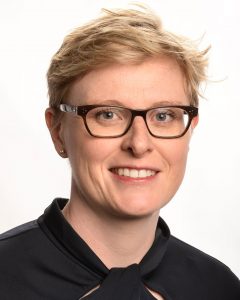Chelsea Elwood is a Clinical Assistant Professor in the department of OBGYN – her research focus is the vaginal microbiome.
What is your day job?
I am a general OBGYN within the Department of Gynecologic Specialties, sub-specializing in reproductive infectious diseases. I also have a strong research component within my practice. I split my time between BC Women’s hospital as well as St. Paul’s Hospital.
What is your primary research focus?
I plan on continuing my work on knowledge translation of the vaginal microbiome, as it relates to reproductive infectious disease.
What drew you to this area of research?
I was actually studying the microbiome before it was even called a microbiome. I completed a Bachelor of Science and a Master’s of Science at Western University in Microbiology and Immunology. By the time I completed my undergrad and was starting my post-graduate work the Human Microbiome Project was just beginning (2008) with the goal of trying to understand what is normal and what may be linked to disease states. This really shaped my career and research interests. After finishing my MSc I ran a translational microbiology lab in the Department of Urology at Western before going into medical school. I knew that I wanted to use my basic science background to inform my clinical practice.
I have worked with the Vaginal Microbiome Group Initiative (VOGUE) since joining the department. We now have 10 years of research to characterize “normal” – we know there is diversity; and that the diversity changes in different states of health. For example, normal healthy pregnancy seems to have much less diversity (Nature Article). We think that disease states may be linked to the level of diversity and the quantity of certain microorganisms. But we are not really sure what to do with this knowledge yet.
We think that understanding the microbiome may be able to help us make more personalized decisions on care.
One of the things that I am passionate about is communicating our current knowledge – what we understand and what we don’t understand. For example – one of the practices that emerged from imperfect knowledge of the microbiome is vaginal seeding – where a newborn delivered via caesarean section is swabbed with the mother’s vaginal secretions to transfer the mother’s vaginal bacteria to the infant, mimicking what the infant would have been exposed to during vaginal birth.
There is no evidence for this and it could even be harmful – we need to work hard not only to fill gaps in knowledge and share our knowledge but also to correct bad information. One of the goals of the Maternal legacy project is to see if the maternal bacterial community is actually transferred to the infant during delivery and if the different types of deliveries alter this transfer.
I am very interested in pursuing research that enables us to use basic science to improve clinical care. Other research I am working on relates to understanding and managing positive blood cultures in post-partum women. We are not sure how to manage positive blood cultures in post-partum women; are antibiotics needed? If so, there are currently no guidelines that apply to women in the pregnant and post-partum period.
I am also working on a new collaboration with the National Microbiology Laboratory in Winnipeg with emerging pathogens. Emerging outbreaks – such as Zika and Ebola – happen all the time. They can be sexually transmitted and so have reproductive health implications (e.g. timing of pregnancy post-infection). We need to understand the basic science mechanisms behind this so that we can make appropriate clinical decisions.
Essentially this is the focus of my research work and interest – as well as sharing knowledge.
What do you find are the biggest challenges in pursuing research while being a clinician?
Of course, like most people, time is always a constraint. Balancing a busy clinical practice and trying to keep up with research is always difficult. Another constraint is trying to find funding.
What are the greatest supports for your research?
The greatest support for my research is the reproductive infectious disease group at BC Women’s Hospital. I also find great support in my fellow infectious disease physicians across the country.
What are your future plans and goals? What would you like your research to achieve?
My main goal with my research is to implement knowledge translation. My 5 year plan is to begin to develop a knowledge translation program and to take the information that we have gained from Dr. Deborah Money’s VOGUE group and translating it to clinical applications.
When you aren’t busy being a clinician and a researcher – what do you do?
I take care of my two beautiful 13 month twins, and sometimes, when they let me, I exercise.